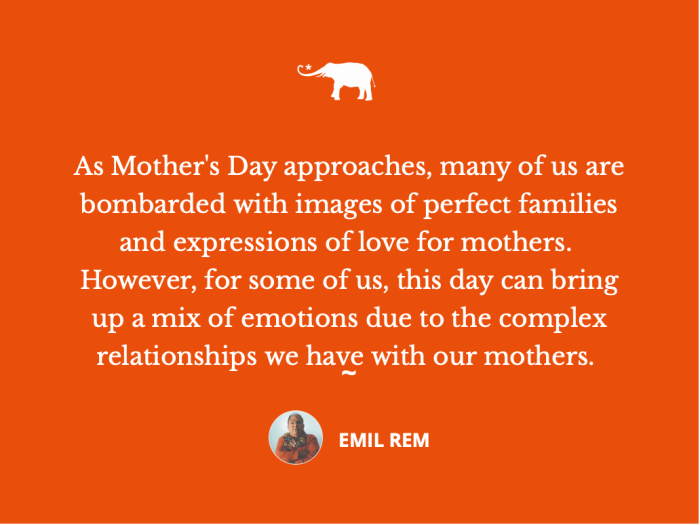As Mother’s Day approaches, many of us are bombarded with images of perfect families and expressions of love for mothers. However, for some of us, this day can bring up a mix of emotions due to the complex relationships we have with our mothers. I understand this paradox firsthand, as my own experiences with my mother have been difficult and challenging.
I was born in Tanzania, East Africa, but when I was a child my mother decided to move to England to chase her dream of going from rags to riches. Her ultimate goal was to make it big so she could be recognized and revered by people who knew her back in Tanzania. She took me with her, separating me from my home. In England, she migrated from one menial job to another once with no particular plan. Realizing she couldn’t chase her dream and take care of me at the same time, she placed me in foster care. As a result, I grew up feeling abandoned and alone.
Later, when I emigrated to Canada, my mother re-entered my life after decades of absence. She moved to Calgary, near me, my wife and our two sons. Our relationship was marked by invective, guilt trips, and constant demands. This caused tensions within my wife and sons since since every one of us were targets.
It would be easy to let anger and bitterness take over and to say that there is nothing in our relationship to honor. But like with everything in life, it’s not that clear cut. There are nuances, and there are silver linings. What’s important is to see them and acknowledge them, with gratitude.
Despite the pain and difficulties, my mother gave me opportunities that shaped my future. Most importantly, she enrolled me in school in England; it was my education that paved the way for my future success as a CPA and an author.
And there were two great silver linings I’m grateful for. The foster family my mother found provided love, stability, structure and the comfort of routine. At first, they agreed to look after me for a couple of weeks. The two weeks ballooned into a decade—a miracle I recognize now.
The challenging context my mother set also gave me the grit and courage to overcome countless other daunting challenges over time. These are reflected in my books, Heart of New York and Chasing Aphrodite, which explore themes of loss, identity, and resilience.
Drawing on my experiences, I can offer some valuable insights about how to face this widespread parent-child paradox.
There are always reasons to be grateful
First and foremost, I encourage you to remember that, regardless of how difficult your relationship with your mother might be, there are still reasons to be grateful towards her. In my case, I am grateful that my mother gave me the gift of education, which opened up so many doors for me. The same principle can apply to any other member of your family, for no relationship is ever simple.
Choose your attitude
I also encourage you to choose your attitude. We all have the power to decide whether to remain bitter or to see challenges and pain as opportunities to grow. It’s not always easy, but I have found that cultivating a positive attitude has helped me to find meaning.
Seize the opportunity to practice empathy
Another important strategy is to use this challenge as an opportunity to practice empathy. Try to put yourself in your mother’s shoes and understand her perspective. Remember that she is only human and that her feelings are no less real and poignant than your own. This doesn’t mean you have to excuse her behavior, but it can help you to find a way forward.
Learn as a parent
Finally, let the experience teach you what you want to do differently as a parent yourself. If you have children of your own, you have the opportunity to create a different kind of relationship with them. Use your experiences with your mother as a guide for what not to do and strive to build a relationship based on love, respect, and open communication.
Today, my mother is blind and has dementia. Compelled by gratitude, I have put in place the best possible care for her in a new Ismaili facility in Calgary. She is surrounded by people of her own faith and language who feed her, pray with her and keep her company around the clock. She never lets go of her caretaker’s hand.
By choosing our attitudes, practicing empathy, and learning from our experiences, we can reframe challenges as a chance to grow—and come out all the stronger for it.
Thank you, Mum.









Read 0 comments and reply